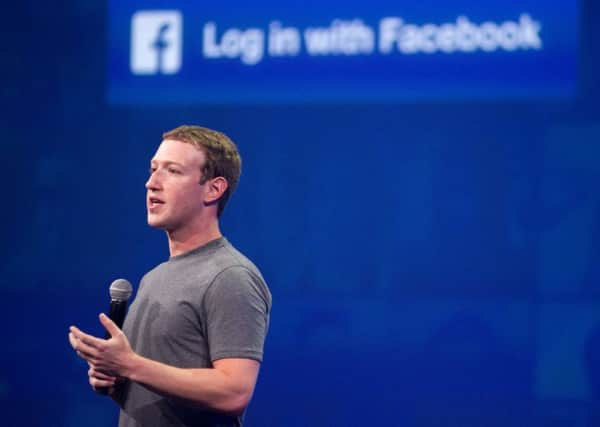Martyn McLaughlin: How to protect your privacy on social media


Over the past decade, the remarkable growth of social media from an outlet for cat-related memes, blurry holiday snaps and idle chatter to an all-powerful force reshaping the world around us has been driven by a single tacit agreement: we open up our lives to Big Tech, and in return enjoy the expediency and efficiency of its free platforms.
It is an unwritten contract that has prompted more than two billion people to sign up to Facebook and, in turn, allowed its CEO, Mark Zuckerberg, to become one of the richest men in the world.
Advertisement
Hide AdAdvertisement
Hide AdThe issue of how that extraordinary expansion was fuelled has long concerned privacy activists, but the growing scandal surrounding the firm’s dealings with Cambridge Analytica has brought the issue firmly into the mainstream.
It was assumed by most consumers that the price of their apparently benign deal with social media’s guardians was minimal, amounting to little more than targeted advertising; search on Google for a new pair of trousers, and your Facebook feed would be polluted with images of breeks afterwards. Irritating? Yes. Creepy? Undoubtedly. But we thought we understood what the algorithms were designed for, even if the design itself eluded us.
Yet the recent revelations about how the granularity of data, fused with immensely complex data science technologies, can exert a powerful influence not just over our shopping habits, but elections, is a game changer.
The application, extraction and exploitation of personal data will be the defining issue of the next decade. The big question most people are asking is what, if anything, they can do about it.
The answer for many is to withdraw altogether. Since the weekend, the #deletefacebook campaign has picked up momentum, with increasing numbers of consumers so appalled that they see no merit in trying to bolster their privacy. Some are even availing themselves of the opportunity to download all the information the firms holds about them, a process akin to lifting the plaster on a fresh cut.
One customer, Dylan McKay, found that between October 2016 and July last year, Facebook collated the metadata of every mobile call he had made, including the time and duration, with similar data held on every text message he sent or received. Another, Emma Kennedy, discovered Facebook had records of every number in her mobile phone, along with a list of every social event she had attended, details of all her friends and their birthdays, and a list of every text she had sent.
There has been a predictable outcry at how the company was able to harvest such intimate details, even though any number of Facebook applications and third-party apps inform users that this information will be gathered. Most people, however, tend not to heed the advisories, and they should be afforded a degree of sympathy.
Such end user licence agreements are written in hopelessly convoluted legalese; when you are whiling away a coffee break with a Facebook quiz or game, who wants to read through reams of impenetrable terms and conditions?
Advertisement
Hide AdAdvertisement
Hide AdBut that excuse only works up to a point. Our shock at the Facebook data misuse is largely borne out of wilful ignorance. We have become accustomed to social media’s convenience and ubiquity, and our optimism surrounding new technology has gone hand in hand with an unfettered promiscuity. The bad news is that even if you delete your Facebook account, the data you have consented to share with third-party developers and affiliates will still be retained by them. You can scrub your digital slate, but you can’t wipe it clean.
In any case, social media is, for many of us, a professional necessity first and a personal pleasure second. We can only retreat so far. Instead, all of us should realise that our data is not an ownerless jumble of code floating in the ether; it is our personal property, and we should necessary steps to safeguard it.
In practical terms, this means installing tracker and ad blockers on browsers, and regularly reviewing and updating privacy settings; a dreary chore, for sure, just like filing away bills or cleaning the shower cubicle, but one that cannot be put off indefinitely. Even more importantly, however, is an attitudinal shift, one which acknowledges how the frippery and furniture of Facebook – those innocuous quizzes and games – are ultimately Trojan horses for data-capture mechanisms.
If that all sounds laborious, help is on the horizon. In May, the General Data Protection Regulation, an EU privacy law restricting how personal information is collected and used, comes into force.
Firms and app providers must make explicit, and in succinct, plain language, what data they will scoop up and the purpose for doing so. It also gives consumers the right to see what information companies have gathered.
These measures are welcome, but they are no panacea. As long as the social media industry is able to regulate itself, offering only gestures at transparency, we need to get smarter.
As consumers, we take pride in the fact we make informed choices, whether that is checking reviews of electronics products before parting with our money, or scrutinising the tariffs of energy firms.
Why should the social media industry remain immune from such vigilance? We may be Facebook’s product, but we can determine how much of our lives we offer up for sale.
